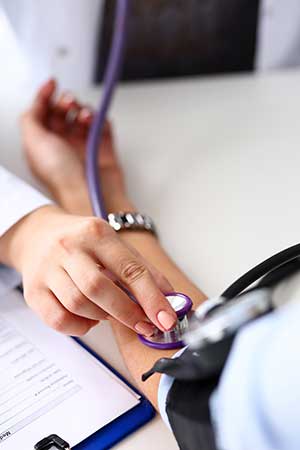Get Help - Find a Rehab Center Today

For help finding an addiction treatment center, Call us!
All calls are 100% confidential and free
1-877-882-9275Medically Reviewed by
Medically Supervised Detox: "The Addict's Greatest Fear"
Withdrawal can be a terrifying prospect for people with addiction who must face the potential for both physical and emotional side effects once they stop using. Symptoms of withdrawal can range from simple annoyances like runny nose or irritability to more severe effects like hallucinations or heart attack.

With the potential for extreme emotional and physical distress, and in some cases, even death, withdrawal is certainly not to be taken lightly. However, there is an answer that can both assist the addicted through withdrawal and help them manage their fears about the process:medically supervised detox.
Why Medically Supervised Detox?
Facing withdrawal is essential if the person suffering from addiction is to reclaim a healthy life. It is only when the addictive substances leave their body that the person addicted can begin to rewire the parts of their brain that have been hijacked by drugs and/or alcohol to achieve a life free from the spiral of addiction. This is where detox comes in. Medically supervised detox can benefit addicts in the following ways:
Medically supervised detox prevents serious complications.
Withdrawal can throw the mind and body into chaos as it relearns how to function without the aid of addictive substances. Depending upon the length and frequency with which the person has been using, the body's response can be severe, and even life-threatening.
Medically supervised detox can help by providing careful monitoring of the person's vital signs in order to ensure that they receive appropriate medical intervention and support if their symptoms require it. In addition, detox facilities can often administer medications to help patients manage symptoms such as insomnia, irritability, and pain.
Medically supervised detox increases the chances of success.
When a person with addiction attempts withdrawal on their own, their chances of success are much lower than if they attend a detox facility. The discomfort of withdrawal can make quitting long enough for withdrawal symptoms to improve very difficult without outside support. Medically supervised detox can reduce discomfort and provide encouragement and support to help people with addiction make it through to the next stage of their rehab.
Withdrawal can be frightening for addicts. Anticipating the effects of withdrawal, as well as the thought of a life without drugs or alcohol, can keep addicts from ever starting the process. The reality, however, is that facing these fears is critical in a successful recovery, and a medically supervised detox facility can help.
Medically supervised detox allows for customized treatments.
Detox facilities are generally well-equipped to handle the variety of needs that people with addiction have. This includes treating their underlying conditions, such as depression, that can be driving their addiction. Together with a therapist, the person can create a treatment plan that addresses their specific needs in order to ensure a smooth transition to the rest of their rehab.
What can be expected from a medically supervised detox?

A detox program will provide the person with addiction a number of support services before, during, and after withdrawal. This support will make it easier to endure withdrawal and find a supportive rehab facility where recovery can be achieved.
Intake
The first step in medically supervised detox is intake. During this part of the process, the detox facility will run blood tests, deliver physical and psychiatric exams, and gather information about the person with addiction's physical and mental health and the habits of drug and alcohol use. They will use this information to develop a supportive treatment program for the individual's detox needs. Often, the person with addiction will be assigned a therapist to help them through the detox process.
Medical Support
As the person with addiction experiences the effects of withdrawal from drugs or alcohol, the detox facility will offer skilled medical support. This can include frequent monitoring of vital signs and the administration of medication to ease symptoms. Throughout this process, the healthcare team will keep the person as comfortable and as safe as possible.
Rehab Preparation
Once the withdrawal period is over (typically within 7-10 days), the detox facility will help the person with addiction establish and implement a plan for continuing rehab. This plan will be based on one's individual needs and should include a referral to additional rehab services.
Detox Fears

Withdrawal can be frightening for people with addiction. Anticipating the effects of withdrawal, as well as the thought of a life without drugs or alcohol, can keep those affected from ever starting the process.
The reality is that facing these fears is critical in a successful recovery. A medically supervised detox facility can help. These facilities support people in their fears by providing them with emotional, physical, and medical support throughout the withdrawal process.
As a result, a person is never alone while they withdraw. Instead, they experience their withdrawal with the support of a therapist and a team of compassionate, skilled personnel who make it their goal to ease discomfort and set them up for a successful recovery.
With support, people with addiction CAN overcome their addictions. The first step is detox.The support from a medically supervised detox facility can make all the difference.
Sources:
Drug Rehabs by State:
- Alabama
- Alaska
- Arizona
- Arkansas
- California
- Colorado
- Connecticut
- Delaware
- Florida
- Georgia
- Hawaii
- Idaho
- Illinois
- Indiana
- Iowa
- Kansas
- Kentucky
- Louisiana
- Maine
- Maryland
- Massachusetts
- Michigan
- Minnesota
- Mississippi
- Missouri
- Montana
- Nebraska
- Nevada
- New Hampshire
- New Jersey
- New Mexico
- New York
- North Carolina
- North Dakota
- Ohio
- Oklahoma
- Oregon
- Pennsylvania
- Rhode Island
- South Carolina
- South Dakota
- Tennessee
- Texas
- Utah
- Vermont
- Virginia
- Washington
- West Virginia
- Wisconsin
- Wyoming
Other Drug and Alcohol Rehab Services:
National Non Profit Helpline - 1-877-882-9275
Our National Non Profit Helpline is a 24/7, 365-day-a-year treatment referral and information service for individuals and families faced with mental and/or substance use disorders.
All calls are strictly confidential
Our service provides referrals to licensed treatment facilities, support groups, and community-based organizations. You don't have to struggle alone with addiction. Help is just a phone call away. Call 1-877-882-9275 now to get the help you need and deserve.




